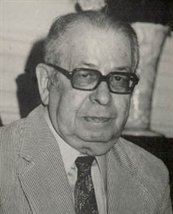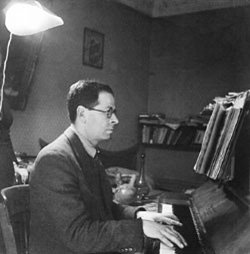Exposé
Music in Auschwitz
The composer Szymon Laks
By Stephan Heber
 December 11, 2008 is the 25th anniversary of the death of the Polish Jewish composer Szymon Laks, who conducted the men’s orchestra of Auschwitz-Birkenau from 1942 to 1944. I see this as an opportunity to bring the composer’s life and work to greater public attention and to perform concerts of his music.
December 11, 2008 is the 25th anniversary of the death of the Polish Jewish composer Szymon Laks, who conducted the men’s orchestra of Auschwitz-Birkenau from 1942 to 1944. I see this as an opportunity to bring the composer’s life and work to greater public attention and to perform concerts of his music.
Szymon Laks survived the Holocaust and documented his story (published in German under the title “Musik in Auschwitz”). My idea is to combine a description of his life and readings from his autobiographical memoirs with the performance of a selection of his works.
Szymon Laks: Life and Music
Szymon Laks was born on November 1, 1901 in Warsaw. He first studied mathematics in Vilnius before taking up studies in composition in Warsaw in 1921. In 1926 he left Poland to continue his studies in Paris. In 1941 he was arrested by French authorities because of his Jewish ancestry and detained near Orléans. From there he was deported to Auschwitz-Birkenau in 1942. He endured the horror of the extermination camp initially as a member and later as arranger and conductor of the men’s orchestra. In October 1944 he was transferred first to Sachsenhausen and then to Dachau, where he was liberated by American troops on April 29, 1945. After the war Laks returned to Paris and composed chamber works, songs and the opera “L’hirondelle inattendue” (“The Unexpected Swallow”). Laks died on December 11, 1983 in Paris.
 „Auschwitz was a kind of „negative“ of the world from which we had been taken. White became black, black became white, values were twisted through 180 degrees – to put it simply, each of us had two choices: either to beat and torture the others or to be beaten and tortured by them. Humanity and self-respect became offences, common sense was a sign of madness, pity became a sign of psycological and moral weakness. Instincts, on the other hand, grew to be camp virtues and became necessary requirements of survival. (...) I survived. To what coincidence do I owe this? I didn’t reject any of the basic human virtues, and yet I still survived. There is no question for me that I owe this to a string of miracles, and above all to the fact that I met countrymen who had preserved a human face and a human heart. My first “miracle” resulted, from a particular moment onwards, in my belonging to the category of prisoners who had a “better standing” in the camp hierarchy, and therefore, at least for a reasonable length of time, I was able to eat better in order to build up enough reserves of strength in the body to survive the last dark hours of the deportation. I was helped in this by ... the music. And so often people have told me that one cannot live from music.
„Auschwitz was a kind of „negative“ of the world from which we had been taken. White became black, black became white, values were twisted through 180 degrees – to put it simply, each of us had two choices: either to beat and torture the others or to be beaten and tortured by them. Humanity and self-respect became offences, common sense was a sign of madness, pity became a sign of psycological and moral weakness. Instincts, on the other hand, grew to be camp virtues and became necessary requirements of survival. (...) I survived. To what coincidence do I owe this? I didn’t reject any of the basic human virtues, and yet I still survived. There is no question for me that I owe this to a string of miracles, and above all to the fact that I met countrymen who had preserved a human face and a human heart. My first “miracle” resulted, from a particular moment onwards, in my belonging to the category of prisoners who had a “better standing” in the camp hierarchy, and therefore, at least for a reasonable length of time, I was able to eat better in order to build up enough reserves of strength in the body to survive the last dark hours of the deportation. I was helped in this by ... the music. And so often people have told me that one cannot live from music.
„No, we didn’t play any funeral marches! On the contrary. The marches we played were joyful, rousing, colourful, funny, and their purpose was to encourage us to work and to live, fitting for the motto of the camp: “Arbeit macht frei”. It was the ambition of every camp commander to found a camp band or orchestra, so that our “guardian angels” could be provided every now and then with a little relaxation, which they desperately needed ...”
“Daily orchestral life in Auschwitz: that was they joy of receiving new instruments – and the knowledge that they had been inherited from those who had been gassed the night before.”
(From Szymon Laks: Musik in Auschwitz)
 The Composer’s Works
The Composer’s Works
Szymon Laks wrote orchestral works, an opera, many songs and numerous chamber works. The vast majority of these pieces have never been printed and are only available as manuscript copies.
For my project I have selected the following pieces for performance:
- Cello sonata (1932)
- Dialogue (1964) for two Violoncelli
- Passacaille (1946) for Cello and Piano
- Suite polonaise (1935) for Violin and Piano
- „Huit chants populaires juifs“ (1947) for Soprano and Piano
- Divertimento for Flute, Piano, Cello and Violin (1966)
- Sonatina for Piano (1927)